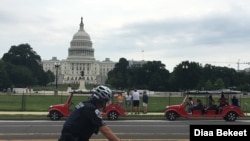A large portion of the United States is in the midst of a heat wave.
Temperatures in the Northeast and Midwest are already high and are expected to climb to record breaking numbers during the weekend. People have been warned to stay hydrated.
Forecasters say more than 87 million Americans live in areas where record temperatures will likely be set Saturday.
The temperature in Washington, DC, the nation's capital, is expected to reach 43.3 degrees Celsius. Meteorologists say for a short while, it will feel just as hot in Washington as Death Valley, California.
National Weather Service forecaster Greg Carbin said the heat wave will be "short and searing."
The NWS warned: "Dangerous high temperatures and humidity could quickly cause heat stress or heat stroke, if precautions are not taken. The very young, the elderly, those without air conditioning, and those participating in strenuous outdoor activities will be the most susceptible. Also, car interiors can reach lethal temperatures in a matter of minutes."
A recent Environmental Protection Agency live air quality tracker reported "unhealthy" air for sensitive groups, including the elderly and young children, along the East Coast from Baltimore, Maryland to Bridgeport, Connecticut, a stretch that includes New York City.
"Daytime hours when the sun is out is clearly our highest risk periods," Dr. Michael Kaufmann, EMS medical director with the Indiana Department of Homeland Security, told the Associated Press. "We're not expecting the drops in temperature at night or the humidity that we often realize when the sun goes down."
Pet owners have been cautioned to avoid walking their animals on paved or concrete areas because the temperature of the surfaces could rise high enough to burn paws.





